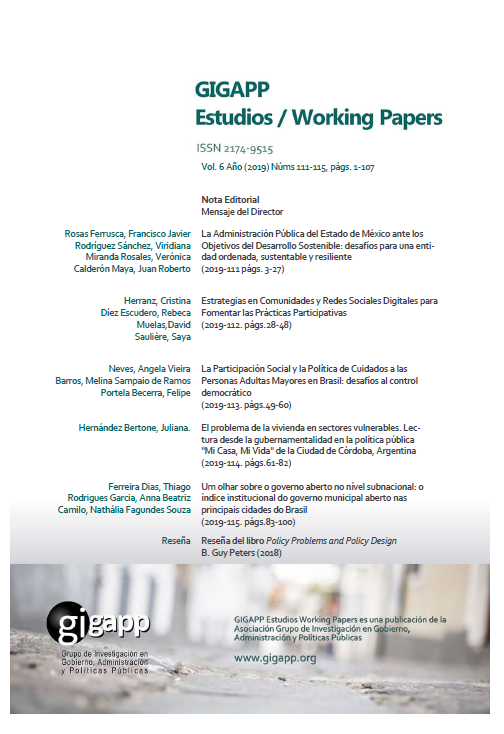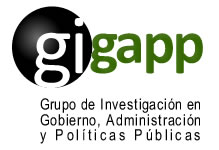Una mirada sobre el gobierno abierto a nivel subnacional
el índice institucional del gobierno municipal abierto en las principales ciudades de Brasil
Resumen
(Ponencia ganadora: Premio Jovenes Investigadores Joan Prats 2018)
Esta investigación analiza la implementación del Gobierno Abierto en las principales ciudades brasileñas, a la luz de la Ley de Acceso a la Información y la perspectiva teórica del Gobierno Abierto. Luego, utilizándose enfoques y técnicas de investigación cualitativas y cuantitativas, la presente investigación de carácter descriptivo y exploratorio, intenta analizar la etapa actual de implementación del gobierno abierto en las 2 mayores ciudades de cada Estado del Brasil, así con el total de 52 ciudades cuya finalidad fue hacer la medición del Índice Institucional de Gobierno Abierto Municipal (IIGAM-Brasil) que pueda apuntar el estado de la presencia del paradigma del gobierno abierto en modo institucional en los gobierno subnacionales (Dias y Oliveira, 2016; Dias, Garcia y Camilo, 2017). Con los datos del índice hecho correlaciones con otros datos socioeconómicos, apuntar el rendimiento de los gobiernos locales y con esto subsidiar las reflexiones sobre los avances, límites y desafíos puestos en el tema Gobierno Abierto subnacionales en Brasil. Los primeros datos apuntan que las dimensiones de colaboración y participación son muy deficitarias, que necesitan mayor atención por los gobernantes, principalmente en la región Norte del Brasil. Ya la transparencia ocurre con mayores mecanismos ya que hay leyes que obligan los municipios en cumplir algunos requisitos de transparencia activa, pero no cumple plenamente las obligaciones de la ley de acceso a la información. En final, es posible apuntar relaciones de los mejores IIGAM-Brasil están asociadas a mejores Índice de Desarrollo Humano y con mayor inserción digital de la población. Señala que el desarrollo de los municipios a través del fortalecimiento de la educación, salud y economía tiene un impacto en la eliminación de las restricciones a las opciones y oportunidades para ejercer una acción racional, con el fin de ampliar las libertades, políticas, económicas y sociales (Sen, 2000) tiene contribución a mejoría de la acción y interacción ciudadana, a través de mecanismos de participación y colaboración.
Descargas
Derechos de autor 2019 Thiago Ferreira Dias, Anna Beatriz Rodrigues Garcia, Nathália Lara Fagundes Souza Camilo

Esta obra está bajo licencia internacional Creative Commons Reconocimiento-NoComercial-CompartirIgual 4.0.
Aquellos autores/as que tengan publicaciones con esta revista, aceptan los términos siguientes:
a. Los autores/as conservarán sus derechos de autor y garantizarán a la revista el derecho de primera publicación de su obra, el cuál estará simultáneamente sujeto a la Licencia de reconocimiento de Creative Commons Attribution-NonCommercial-ShareAlike 4.0 International (CC BY-NC-SA 4.0) que permite a terceros compartir la obra siempre que se indique su autor y su primera publicación esta revista.
Con esta licencia de acceso abierto, los lectores (usuarios) pueden:
- Compartir — copiar y redistribuir el material en cualquier medio o formato
- Adaptar — remezclar, transformar y construir a partir del material
Bajo los siguientes términos:
-
Atribución — usarios deberán dar crédito de manera adecuada, brindar un enlace a la licencia, e indicar si se han realizado cambios. Puede hacerlo en cualquier forma razonable, pero no de forma tal que sugiera que usted o su uso tienen el apoyo de la licenciante.
-
NoComercial — usuarios no puede hacer uso del material con propósitos comerciales.
-
CompartirIgual — Si remezcla, transforma o crea a partir del material, usuarios deben distribuir su contribución bajo la misma licencia del original.
-
Sin restricciones adicionales: los usuarios no pueden aplicar términos legales o medidas tecnológicas que restrinjan legalmente a otros de hacer cualquier cosa que permita la licencia.
b. Los autores/as podrán adoptar otros acuerdos de licencia no exclusiva de distribución de la versión de la obra publicada (p. ej.: depositarla en un archivo telemático institucional o publicarla en un volumen monográfico) siempre que se indique la publicación inicial en esta revista
c. Se permite y recomienda a los autores/as difundir su obra a través de Internet (p. ej.: en archivos telemáticos institucionales o en su página web) antes y durante el proceso de envío, lo cual puede producir intercambios interesantes y aumentar las citas de la obra publicada. (Véase El efecto del acceso abierto).



